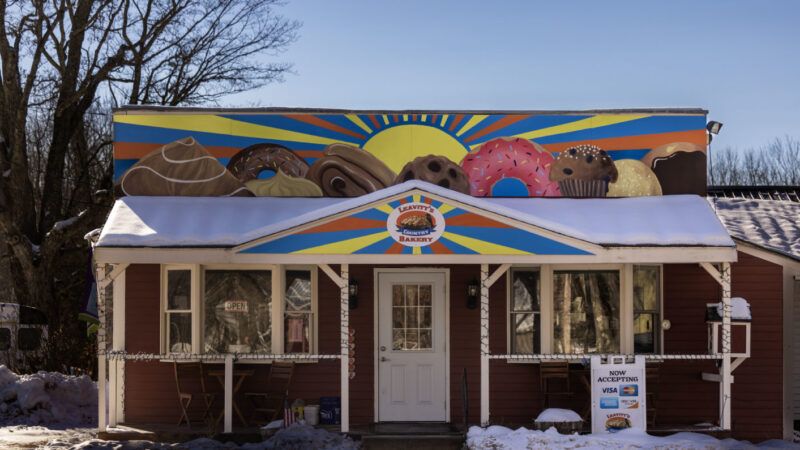Lawsuit Over New Hampshire Donut Mural Heads to Trial
Conway, New Hampshire, is trying to make a local bakery take down a mural of colorful baked goods. The bakery says that violates its First Amendment rights.

Can a local government prevent a business owner from painting a mural on their own property? That question is now before a New Hampshire federal court following a dispute over one bakery's painting of baked goods above its store in Conway, New Hampshire.
Leavitt's Country Bakery is an acclaimed bakery in small-town New Hampshire—even getting the No. 1 spot on a local news outlet's list of the "best doughnuts in New Hampshire" in 2022. That year, owner Sean Young collaborated with a local high school's art class to paint a mural for the store. The class painted a colorful mural of baked goods—muffins, donuts, and cookies—arranged to resemble a mountain range, with brightly colored sunbeams in the background. The mural was painted on panels and installed above the storefront.
While community members seemed to appreciate the mural, the local government did not. According to a lawsuit filed on behalf of the store by the Institute for Justice (I.J.), a public interest law firm, about a week after the mural was unveiled, the town's Code Enforcement Officer Jeremy Gibbs told Young that his mural broke local zoning rules. Further, Gibbs admitted that the action against the mural wasn't motivated by an outside complaint—instead, he decided to step in after seeing a news story about the colorful mural.
How could a town possibly tell business owners how to paint their storefronts? The town has claimed that the painting is not a mural, but instead a sign, and that the display was too large for a sign. But what makes the display a sign? According to the suit, Conway's local laws define a "sign" incredibly broadly, subjecting just about any kind of physical posting to regulations. But the town doesn't actually enforce these rules. Instead, "if Town officials perceive a physical display as conveying a message in any way related to business, they deem the physical display a sign. But if Town officials perceive a physical display as conveying a message not related to business, they deem it a mural," the suit reads.
Since Young's mural depicts baked goods, the town argued that it counts as a commercial sign—and is therefore subject to restrictive zoning rules. However, the suit points out that the town can't decide to treat two murals differently based on the content. "Imposing different burdens on speech depending on who is speaking and what is being said is content based and speaker based restriction on free speech," the suit argues.
In the meantime, Young is placed in an infuriating position. "If Sean does not remove the mural, he risks criminal charges and fines of $275 per day," the suit reads. "If he does remove it, the community will lose this delightful display, and the expressive message that Sean and Leavitt's seek to convey through the mural will be extinguished."
So far, the mural has been allowed to stay up while the case—first filed in 2023—works through the legal process. Young may soon find out if his mountain of donuts gets to stay up for good, as the case is heading to trial on Friday.


Show Comments (17)